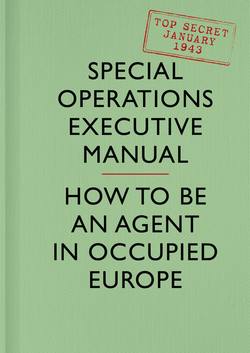Читать книгу SOE Manual: How to be an Agent in Occupied Europe - Special Executive Operations - Страница 14
ОглавлениеA. 6
August 44
INTERROGATIONS.
1. GENERAL.
Interrogations can be divided into three classes:-
a) Carried out by Local Police. Generally on account of infringement of minor regulations. Usually confined to four simple questions:–
i) Who are you?
ii) Where do you come from?
iii) What papers have you?
iv) What are you doing?
If able to satisfy the police on these points, suspect is generally released. In the event of any discrepancies he will be subjected to further interrogation.
Immediately after arrival or after any parachute operation in the neighbourhood, you should be prepared to answer plausibly these questions:–
i) Where are you?
ii) Where do you come from?
iii) How did you come?
iv) Where are you going?
v) Who is and where is the last person you spoke to who knows you personally?
vi) Give details of this locality.
b) Carried out by Specialist Police. Indicate type of police. To find out whether a person is definitely suspect, e.g. through having failed to satisfy the local police in the preliminary interrogation. Suspect will have to satisfy the police that his “story” and papers are genuine. His replies will probably be checked. Attempts may be made to catch him out by producing facts which he thinks the Police do not know.
c) Carried out by Gestapo, or equivalent authority, after arrest. For a person seriously suspected, e.g. because he has failed to satisfy local police and Gestapo in previous interrogations or because he has been caught red-handed. This interrogation may last from 24 hours to many months. Methods are manifold but aim is single – to extract a confession. No rules; nothing barred; “all-in”.
2. INTERROGATION METHODS.
a) Before Interrogation.
i) Sudden but polite arrest on pretext of unimportant enquiry, followed by indefinite detention to prevent warning of associates.
ii) Sudden arrest in the middle of the night when vitality is at its lowest.
iii) Complete house and body search. Exhaustive enquiries about suspect’s life and activities in order to collect as much evidence as possible before interrogation.
iv) Treatment in prison all part of interrogation plan, e.g. bad food, alternatively good food, comfort and discomfort, comparative liberty and solitary confinement, promising visits from friends, etc. Object is to break down moral strength before actual questioning.
b) During Interrogation.
Every effort will be made to make the prisoner feel ill at ease both physically and mentally. Some of the following methods may be tried:-
i) Prisoner facing strong light; unable to see examiner properly.
ii) Prisoner may be made to assume uncomfortable or humiliating postures.
iii) Prisoner seated on uncomfortable chair. Not allowed to eat, drink or smoke while examiners indulge in all three.
iv) Prisoner may be wholly or partly stripped sometimes in the presence of members of the opposite sex.
v) Prisoner may be at one end of a long bare room and this isolation may be emphasised by the interrogators pretending to ignore the prisoner.
